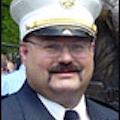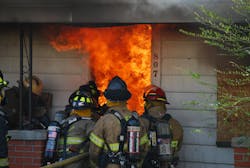Since 1985 I have been involved with training in one way or another. I am completely convienced that outstanding organizations in our realm become outstanding by helping their people grow and progress through a formalized training program. Organizations who don't train find dozens of excuses not to institute training programs. One of the most frequently used excuses is funding. Unfortunately training is all too frequently viewed as a discretionary expenditure. Training funds are usually the first cut from a budget and all to often the last incorporated.
To move an organization from the good to great status it requires that the personnel be trained. In fact, we should train people to be outstanding. So what does this train to be outstanding truely mean? It means we should following a process in which we are focused on closing the "Gaps" of the organization or the individuals. This means equiping the personnel with all of the skills, knowledge and ability that is required to be successful both from an organizational point and a personal prospective. Training that pays off can be aquired or developed if youknow what to look for. A training process that works meets seven key criteria. In using the acronym PROCESS, these seven characteristics are:
Practical Content: In this we are looking for excellent content. This is content that is practical and it is only practical when it help your personnel know what to do (concepts and principles), how to do it (techniques and methods) and why they should do it that way (purpose, idiology, reason mostly learned vicariously).
Repitition: The motor to learning is repitition. People need repition in order to successfully navigate the four stages of learning; aware, awkward, comfort, reflex action. thus the old addage of "don't train till you get it right train till you can't get it wrong".
Ownership by Management: Though training officers are a very valuable resource, in the end, it is the company officer or senior officer's job to train and develop people. In fact it is their number one obligation every single day.
Consistent Message: The messages we send through our training programs must be consistent over time and across all that we train. It is so important for each group to hear, see and learn the same things.
Easily Customized: Customization is important but highly misunderstood. We think it has to do with an organizations name or logo. this is far from the truth. What we need for customization is the connection between content and problems. the formula of Problems + Conversation + Practical Content = Customization should be your guide.
Support Tools: Every department's training program will have different focuses to meet the needs of the organization. Remember that we should stay focused on a few things. first keeping the mission and vision in focus is key.
Specific Plan: Like anything done well, training needs to follow a plan. Remember we are trying to create a strong vehicle to travel the road map laid out. Our goals are to ensure each step fits the culture,pace of work and logistical issues of the organization not to forget the personnel developmental needs. We must know the following; where we have been, where we are now, where we should be and where we are going.
People are any organizations greatest asset, but only outstanding organizations support those words with training.
About the Author

Doug Cline
Douglas Cline, is a 28-year veteran and student of the Fire Service serving as Training Commander with the High Point (NC) Fire Department. Cline also serves in the position of Administrative Assistant Chief with the Ruffin Volunteer Fire Department.
Cline, a former Fire Chief, is a North Carolina Level II Fire Instructor, National Fire Academy Instructor and an EMT-Paramedic instructor/coordinator for the North Carolina Office of Emergency Medical Services. Cline is a member of the North Carolina Society of Fire Service Instructors and the International Society of Fire Service Instructors where he serves on the Board of Directors as the First Vice President. Cline also has on the FEMA grant criteria development committee, peer reviewer for the Fire Act Grants, the Northern Director for the Piedmont North Carolina Fireman’s Association, Piedmont Director for the North Carolina Fallen Firefighters Foundation and Southeastern Association of Fire Chief’s Conference planning committee. Chief Cline also serves as Second Vice President of the Southeastern Division of the International Association of Fire Chiefs.
Cline was honored as the International Society of Fire Service Instructors (ISFSI), 1999 George D. Post International Instructor of the Year. Cline is also a member of National Association of EMS Educators (NAEMSE). He holds a Bachelors Degree in Social Services with a Minor in Education from Concord University.
Cline is a well known international speaker presenting dynamic power packed programs on instructor development, officer development, rapid intervention team training and firefighter safety and survival. Cline also is a highly published author with the most recent publications being with Thomson-Delmar Learning. The Publications are the Company Officer Test Preparation Guide Book with a scenario training DVD. Chief Cline is the technical content advisor for the Rapid Intervention Team Book published by Thomson-Delmar Learning and contributing author to the instructor support materials for the Rapid Intervention Team Book published by Thomson-Delmar Learning, test bank developer for the Fire Department Incident Safety Officer Book and contributing author to the instructor support materials for the Rapid Intervention Team Book published by Thomson-Delmar Learning. Chief Cline has also been a contributing author and reviewer to several of the IFSTA and Brady Emergency Medical Technician texts.
Cline hosts the monthly “Training and Tactics Talk” pod cast on Firehouse.com. Cline also has multiple training videos with the Fire Emergency Training Network (FETN) and American Heat to include, Rapid Intervention Team Training, Vehicle Fires, Hose line Management, Emergency Vehicle Operations and Fire Ground Safety and Survival. Cline is also a contributing editor to Firehouse.com and The Pennsylvania Fireman Magazine.
